Dongmin Park
THINKSAFE: Self-Generated Safety Alignment for Reasoning Models
Jan 30, 2026Abstract:Large reasoning models (LRMs) achieve remarkable performance by leveraging reinforcement learning (RL) on reasoning tasks to generate long chain-of-thought (CoT) reasoning. However, this over-optimization often prioritizes compliance, making models vulnerable to harmful prompts. To mitigate this safety degradation, recent approaches rely on external teacher distillation, yet this introduces a distributional discrepancy that degrades native reasoning. We propose ThinkSafe, a self-generated alignment framework that restores safety alignment without external teachers. Our key insight is that while compliance suppresses safety mechanisms, models often retain latent knowledge to identify harm. ThinkSafe unlocks this via lightweight refusal steering, guiding the model to generate in-distribution safety reasoning traces. Fine-tuning on these self-generated responses effectively realigns the model while minimizing distribution shift. Experiments on DeepSeek-R1-Distill and Qwen3 show ThinkSafe significantly improves safety while preserving reasoning proficiency. Notably, it achieves superior safety and comparable reasoning to GRPO, with significantly reduced computational cost. Code, models, and datasets are available at https://github.com/seanie12/ThinkSafe.git.
Active Learning for Continual Learning: Keeping the Past Alive in the Present
Jan 24, 2025Abstract:Continual learning (CL) enables deep neural networks to adapt to ever-changing data distributions. In practice, there may be scenarios where annotation is costly, leading to active continual learning (ACL), which performs active learning (AL) for the CL scenarios when reducing the labeling cost by selecting the most informative subset is preferable. However, conventional AL strategies are not suitable for ACL, as they focus solely on learning the new knowledge, leading to catastrophic forgetting of previously learned tasks. Therefore, ACL requires a new AL strategy that can balance the prevention of catastrophic forgetting and the ability to quickly learn new tasks. In this paper, we propose AccuACL, Accumulated informativeness-based Active Continual Learning, by the novel use of the Fisher information matrix as a criterion for sample selection, derived from a theoretical analysis of the Fisher-optimality preservation properties within the framework of ACL, while also addressing the scalability issue of Fisher information-based AL. Extensive experiments demonstrate that AccuACL significantly outperforms AL baselines across various CL algorithms, increasing the average accuracy and forgetting by 23.8% and 17.0%, respectively, in average.
Alignment without Over-optimization: Training-Free Solution for Diffusion Models
Jan 10, 2025



Abstract:Diffusion models excel in generative tasks, but aligning them with specific objectives while maintaining their versatility remains challenging. Existing fine-tuning methods often suffer from reward over-optimization, while approximate guidance approaches fail to optimize target rewards effectively. Addressing these limitations, we propose a training-free sampling method based on Sequential Monte Carlo (SMC) to sample from the reward-aligned target distribution. Our approach, tailored for diffusion sampling and incorporating tempering techniques, achieves comparable or superior target rewards to fine-tuning methods while preserving diversity and cross-reward generalization. We demonstrate its effectiveness in single-reward optimization, multi-objective scenarios, and online black-box optimization. This work offers a robust solution for aligning diffusion models with diverse downstream objectives without compromising their general capabilities. Code is available at https://github.com/krafton-ai/DAS .
Rare-to-Frequent: Unlocking Compositional Generation Power of Diffusion Models on Rare Concepts with LLM Guidance
Oct 29, 2024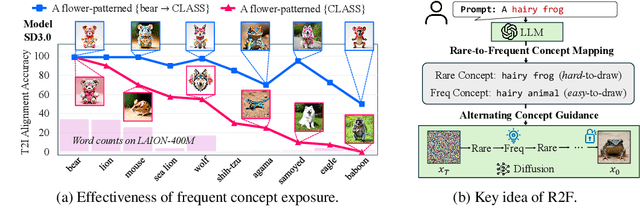



Abstract:State-of-the-art text-to-image (T2I) diffusion models often struggle to generate rare compositions of concepts, e.g., objects with unusual attributes. In this paper, we show that the compositional generation power of diffusion models on such rare concepts can be significantly enhanced by the Large Language Model (LLM) guidance. We start with empirical and theoretical analysis, demonstrating that exposing frequent concepts relevant to the target rare concepts during the diffusion sampling process yields more accurate concept composition. Based on this, we propose a training-free approach, R2F, that plans and executes the overall rare-to-frequent concept guidance throughout the diffusion inference by leveraging the abundant semantic knowledge in LLMs. Our framework is flexible across any pre-trained diffusion models and LLMs, and can be seamlessly integrated with the region-guided diffusion approaches. Extensive experiments on three datasets, including our newly proposed benchmark, RareBench, containing various prompts with rare compositions of concepts, R2F significantly surpasses existing models including SD3.0 and FLUX by up to 28.1%p in T2I alignment. Code is available at https://github.com/krafton-ai/Rare2Frequent.
Mitigating Dialogue Hallucination for Large Multi-modal Models via Adversarial Instruction Tuning
Mar 15, 2024



Abstract:Mitigating hallucinations of Large Multi-modal Models(LMMs) is crucial to enhance their reliability for general-purpose assistants. This paper shows that such hallucinations of LMMs can be significantly exacerbated by preceding user-system dialogues. To precisely measure this, we first present an evaluation benchmark by extending popular multi-modal benchmark datasets with prepended hallucinatory dialogues generated by our novel Adversarial Question Generator, which can automatically generate image-related yet adversarial dialogues by adopting adversarial attacks on LMMs. On our benchmark, the zero-shot performance of state-of-the-art LMMs dropped significantly for both the VQA and Captioning tasks. Next, we further reveal this hallucination is mainly due to the prediction bias toward preceding dialogues rather than visual content. To reduce this bias, we propose Adversarial Instruction Tuning that robustly fine-tunes LMMs on augmented multi-modal instruction-following datasets with hallucinatory dialogues. Extensive experiments show that our proposed approach successfully reduces dialogue hallucination while maintaining or even improving performance.
Prioritizing Informative Features and Examples for Deep Learning from Noisy Data
Feb 27, 2024


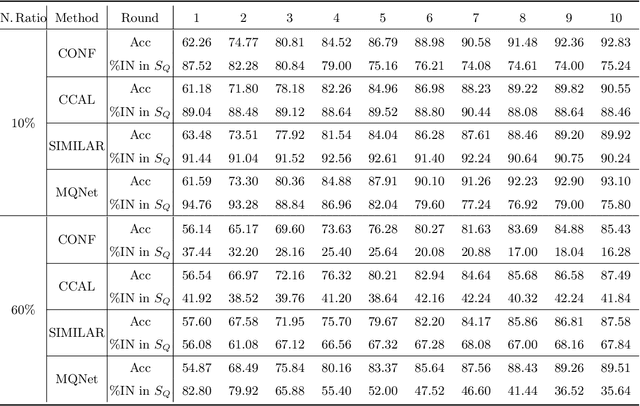
Abstract:In this dissertation, we propose a systemic framework that prioritizes informative features and examples to enhance each stage of the development process. Specifically, we prioritize informative features and examples and improve the performance of feature learning, data labeling, and data selection. We first propose an approach to extract only informative features that are inherent to solving a target task by using auxiliary out-of-distribution data. We deactivate the noise features in the target distribution by using that in the out-of-distribution data. Next, we introduce an approach that prioritizes informative examples from unlabeled noisy data in order to reduce the labeling cost of active learning. In order to solve the purity-information dilemma, where an attempt to select informative examples induces the selection of many noisy examples, we propose a meta-model that finds the best balance between purity and informativeness. Lastly, we suggest an approach that prioritizes informative examples from labeled noisy data to preserve the performance of data selection. For labeled image noise data, we propose a data selection method that considers the confidence of neighboring samples to maintain the performance of the state-of-the-art Re-labeling models. For labeled text noise data, we present an instruction selection method that takes diversity into account for ranking the quality of instructions with prompting, thereby enhancing the performance of aligned large language models. Overall, our unified framework induces the deep learning development process robust to noisy data, thereby effectively mitigating noisy features and examples in real-world applications.
Adaptive Shortcut Debiasing for Online Continual Learning
Dec 14, 2023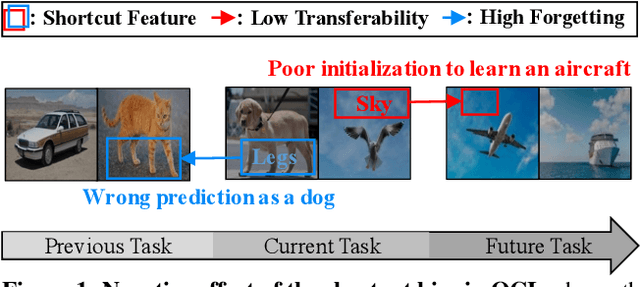
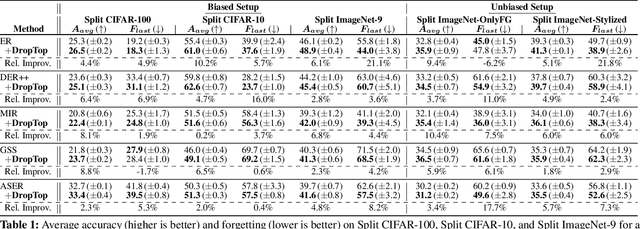
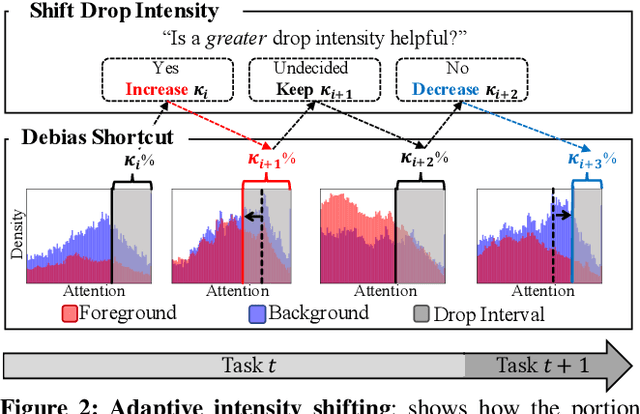
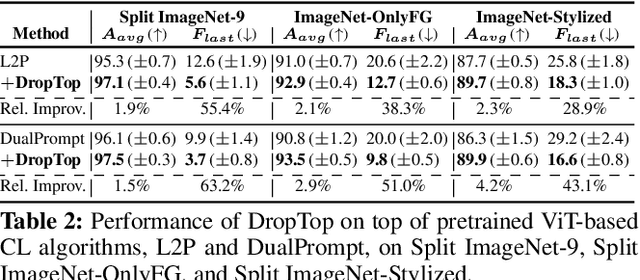
Abstract:We propose a novel framework DropTop that suppresses the shortcut bias in online continual learning (OCL) while being adaptive to the varying degree of the shortcut bias incurred by continuously changing environment. By the observed high-attention property of the shortcut bias, highly-activated features are considered candidates for debiasing. More importantly, resolving the limitation of the online environment where prior knowledge and auxiliary data are not ready, two novel techniques -- feature map fusion and adaptive intensity shifting -- enable us to automatically determine the appropriate level and proportion of the candidate shortcut features to be dropped. Extensive experiments on five benchmark datasets demonstrate that, when combined with various OCL algorithms, DropTop increases the average accuracy by up to 10.4% and decreases the forgetting by up to 63.2%.
One Size Fits All for Semantic Shifts: Adaptive Prompt Tuning for Continual Learning
Nov 18, 2023



Abstract:In real-world continual learning scenarios, tasks often exhibit intricate and unpredictable semantic shifts, posing challenges for fixed prompt management strategies. We identify the inadequacy of universal and specific prompting in handling these dynamic shifts. Universal prompting is ineffective for tasks with abrupt semantic changes, while specific prompting struggles with overfitting under mild semantic shifts. To overcome these limitations, we propose an adaptive prompting approach that tailors minimal yet sufficient prompts based on the task semantics. Our methodology, SemPrompt, incorporates a two-level semantic grouping process: macroscopic semantic assignment and microscopic semantic refinement. This process ensures optimal prompt utilization for varying task semantics, improving the efficiency and effectiveness of learning in real-world CL settings. Our experimental results demonstrate that SemPrompt consistently outperforms existing methods in adapting to diverse semantic shifts in tasks.
Robust Data Pruning under Label Noise via Maximizing Re-labeling Accuracy
Nov 02, 2023Abstract:Data pruning, which aims to downsize a large training set into a small informative subset, is crucial for reducing the enormous computational costs of modern deep learning. Though large-scale data collections invariably contain annotation noise and numerous robust learning methods have been developed, data pruning for the noise-robust learning scenario has received little attention. With state-of-the-art Re-labeling methods that self-correct erroneous labels while training, it is challenging to identify which subset induces the most accurate re-labeling of erroneous labels in the entire training set. In this paper, we formalize the problem of data pruning with re-labeling. We first show that the likelihood of a training example being correctly re-labeled is proportional to the prediction confidence of its neighborhood in the subset. Therefore, we propose a novel data pruning algorithm, Prune4Rel, that finds a subset maximizing the total neighborhood confidence of all training examples, thereby maximizing the re-labeling accuracy and generalization performance. Extensive experiments on four real and one synthetic noisy datasets show that \algname{} outperforms the baselines with Re-labeling models by up to 9.1% as well as those with a standard model by up to 21.6%.
Meta-Query-Net: Resolving Purity-Informativeness Dilemma in Open-set Active Learning
Oct 13, 2022
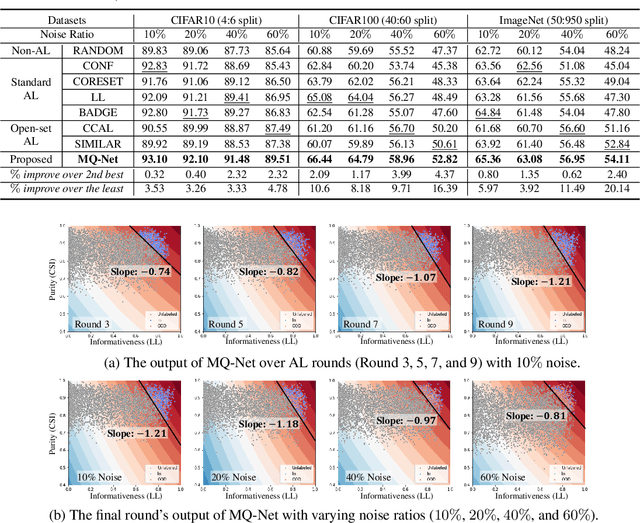
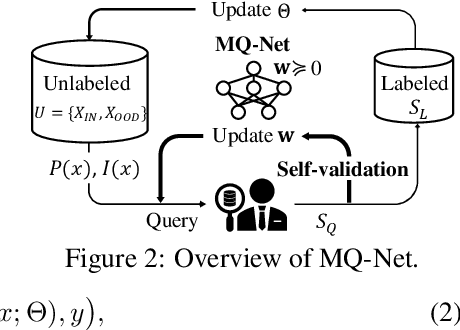

Abstract:Unlabeled data examples awaiting annotations contain open-set noise inevitably. A few active learning studies have attempted to deal with this open-set noise for sample selection by filtering out the noisy examples. However, because focusing on the purity of examples in a query set leads to overlooking the informativeness of the examples, the best balancing of purity and informativeness remains an important question. In this paper, to solve this purity-informativeness dilemma in open-set active learning, we propose a novel Meta-Query-Net,(MQ-Net) that adaptively finds the best balancing between the two factors. Specifically, by leveraging the multi-round property of active learning, we train MQ-Net using a query set without an additional validation set. Furthermore, a clear dominance relationship between unlabeled examples is effectively captured by MQ-Net through a novel skyline regularization. Extensive experiments on multiple open-set active learning scenarios demonstrate that the proposed MQ-Net achieves 20.14% improvement in terms of accuracy, compared with the state-of-the-art methods.
 Add to Chrome
Add to Chrome Add to Firefox
Add to Firefox Add to Edge
Add to Edge